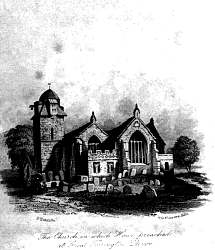


"And when He was come near, he beheld the city, and
wept over it, saying, if thou hadst known, even thou, at least on this thy day,
the things which belong unto thy peace! but now they are hid from thine
eyes."---Luke, x1x. 41,42.
WE have here a compassionate lamentation in
the midst of a solemn triumph. Our Lord's approach unto Jerusalem at this time,
and his entrance into it (as the foregoing history shews), carried with them
some face of regal and triumphal pomp, but with such allays, as discovered a
mind most remote from ostentation; and led by judgment (not vain glory), to
transmit through a dark umbrage some glimmerings only of that excellent majesty
which both his sonship sand his mediatorship entitled him unto; a very modest
and mean specimen of His true indubious royalty and kingly state ; such as
might rather intimate than plainly declare it, and rather afford an
after-instruction to teachable minds, than beget a present conviction and dread
in the stupidly obstinate and unteachable. And this effect we find it had, as
is observed by another evangelical historian; who relating the same matter, how
in his passage to Jerusalem the people met him with branches of palmtrees and
joyful hosannas, he riding upon an ass's colt (as princes or judges, to signify
meekness as much as state, were wont to do, Judges v. 10), tells us, these
things his disciples understood not at the first, but when Jesus was glorified,
then remembered they that these things were written of him, and that they had
done these things unto Him, John, xii. 16. For great regard was had in this, as
in all the acts of his life and ministry, to that last and conclusive part, his
dying a sacrifice upon the cross for the sins of men; to observe all along that
mediocrity, and steer that middle course between obscurity and a terrifying,
overpowering glory, that this solemn oblation of himself might neither be
prevented, nor be disregarded. Agreeably to this design, and the rest of his
course, he doth, in this solemnity, rather discover his royal state and dignity
by a dark emblem, than by an express representation; and shews in it more of
meekness and humility, than of awful majesty and magnificence, as was formerly
predicted, Zech. ix. 9. "Rejoice greatly, 0 daughter of Zion; shout, 0
daughter of Jerusalem: behold, thy King cometh unto thee: he is just, and
having salvation; lowly, and riding upon an ass, and upon a colt the foal of an
ass."
And how little he was taken in this piece of state, is
sufficiently to be seen in this paragraph of the chapter. His mind is much more
taken up in the foresight of Jerusalem's sad case; and therefore being come
within view of it (which he might very commodiously have in the descent of the
higher opposite hill, mount Olivet), he beheld the city, "tis said, and wept
over it. Two things concur to make up the cause of this sorrow : -
1. The
greatness of the calamity; Jerusalem, once so dear to God, was to suffer,not a
scar, but a ruin;- " The days shall come upon thee, that thine enemies shall
cast a trench about thee, and cornpass thee in on every side, and shall lay
thee even with the ground, and thy children within thee; and they shall not
leave in thee one stone upon another :" and -
2. The lost opportunity of
preventing it ; - " if thou hadst known, even thou, at least in this thy day,
the things which belong to thy peace! but now they are hid from thine eyes,"
ver. 42. And again, "Thou knewest not the time of thy visitation." First, The
calamity was greater in his eyes, than it can be in ours. His large and
comprehensive mind could take the compass of this sad case. Our thoughts cannot
reach far, yet we can apprehend what may make this case very deplorable; we can
consider Jerusalem as the city of the great King, where was the palace and
throne of the Majesty of heaven, vouchsafing to "dwell with men on earth." Here
the divine light and glory had long shone here was the sacred Shechinah, the
dwelling-place of the Most High, the symbols of his presence, the seat of
worship, the mercy-seat, the place of receiving addresses, and of dispensing
favours; "The house of prayer for all nations." To his own people this was the
city of their solemnities, whither the tribes were wont to go up, the tribes of
the Lord, unto the testimony of Israel, to give thanks unto the name of the
Lord: for there were set thrones of judgment, the thrones of the house of
David, Psal. cxxii. 4,5. He that was so great a lover of the souls of men, how
grateful and dear to his heart had the place been where through the succession
of many by-past ages the great God did use (though more obscurely) to unfold
his kind intentions towards sinners, to hold solemn treaties with them, to make
himself known, to draw and allure souls into his own holy worship and
acquiintance! And that now the dismal prospect presents itself of desolation
and ruin, ready to overwhelm all this glory! And lay waste the dwellings of
divine love! His sorrow must be conceived proportionable to the greatness of
this desolating change.
Secondly
Go to
Next Chapter.
Home | Literature | Links